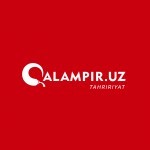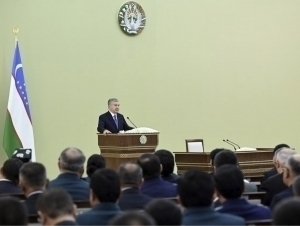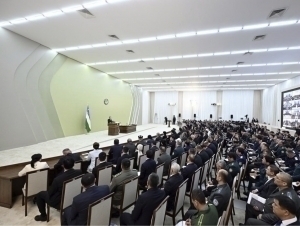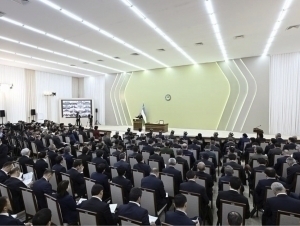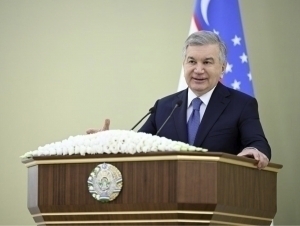President searches for integrity amid corruption
Local
−
05 March 2025 19648 10 minutes
Bizlar arra tortmoqdamiz,
We are sawing the wood,
Arramizning tishi yo‘q.
But our saw has no teeth.
Nega arrang tishi yo‘q, deb
Why does the saw have no teeth,
So‘raydigan kishi yo‘q.
No one even asks.
Chunki bizlar anoyimas,
Because we are not naive,
Pishib ketgan ko‘zimiz.
Our eyes are well-seasoned (experienced).
Arra tushgan o‘sha shoxda
We are sitting on the very branch,
O‘ltiribmiz o‘zimiz.
That we are sawing off ourselves.
This poem by the late Uzbek poet Erkin Vohidov resonates deeply with the current state of Uzbekistan's fight against corruption. Despite numerous anti-corruption slogans and millions spent on awareness campaigns, the results remain far from satisfactory. Corruption persists, and both the number of corrupt individuals and the scale of bribery continue to grow.
President Shavkat Mirziyoyev is acutely aware of these challenges and has expressed his dissatisfaction with the country's anti-corruption efforts. On March 5, he chaired an expanded meeting of the National Council on Anti-Corruption, focusing on the effectiveness of preventive measures and future priorities.
Currently, Uzbekistan has anti-corruption committees in both chambers of parliament, as well as a National Council and an Anti-Corruption Agency. However, their impact on the daily lives of ordinary citizens remains limited. In 2024, Uzbekistan ranked 121st out of 180 countries in the global corruption index, trailing behind neighboring Kazakhstan (88th), Georgia (53rd), Armenia (63rd), and Belarus (113th).
During the meeting, it was noted that law enforcement agencies primarily focus on identifying and punishing corruption rather than addressing its root causes. The 1,285 employees working in anti-corruption compliance structures across 117 ministries and agencies have failed to make a significant impact in eliminating corruption risks.
Each year, numerous decisions are made to improve the business environment, attract investments, and create jobs by reducing bureaucracy and barriers. For instance, entrepreneurs are required to obtain compliance certificates for 6,500 types of products, with 3,700 requiring separate certification for each batch. Similar lists exist in sanitary, quarantine, and veterinary departments, all of which customs must handle. Despite these challenges, compliance officers in these agencies have not proposed any solutions to reduce such burdens.
President Mirziyoyev criticized the Anti-Corruption Agency for its lack of effectiveness, describing its staff as mere statisticians who count criminal cases instead of analyzing specific sectors and proposing solutions. He noted that agency leaders have not visited areas with high corruption risks, such as district health departments, employment offices, or bank branches, nor have they offered modern system-based recommendations.
The President also highlighted the lack of initiative in parliamentary budget committees, which fail to address corruption in the three ministries receiving the largest budget allocations annually.
During the meeting, Prime Minister Abdulla Aripov was instructed to dismiss the heads of internal anti-corruption structures in 117 ministries and agencies and replace them with honest, dedicated, and professional personnel. These new appointees will be given clear responsibilities. However, this raises the question: how will the Prime Minister measure their integrity?
Ministers will now be directly responsible for appointing regional compliance officers and will bear political accountability for corruption within their systems. While this increases ministerial responsibility, concerns remain about the integrity of the ministers themselves.
President Mirziyoyev announced that the Anti-Corruption Agency's operational approach would undergo a complete overhaul. As a trial, compliance oversight for five entities—the Ministries of Health, Construction, and Water Resources, as well as Uzbekneftgaz and Uzsuvta’minot—will be transferred to the agency. By the end of the year, these ministries will report to the National Council on the number of corruption risks eliminated and the improvements made for citizens.
By the end of the year, each ministry will report to the National Council on how many corruption risks have been eliminated and what improvements have been made for citizens. Additionally, the Anti-Corruption Agency, in collaboration with ministers and governors, will conduct quarterly in-depth studies in at least three sectors with high corruption levels, down to the district level. These studies will identify which processes need digitization and which bureaucratic procedures should be eliminated.
It was revealed that 75% of corruption crimes occur at the district and neighborhood levels, often in the form of petty corruption. Common areas of concern include infrastructure connections, obtaining licenses, allocating preferential loans, hiring processes, and professional development.
President Mirziyoyev criticized the current approach of investigators, prosecutors, and judges, stating that their work often does not go beyond issuing formal recommendations and decisions, which lack meaningful follow-up. Regional anti-corruption councils, led by governors, were also criticized for their lack of connection to district and neighborhood-level issues, resulting in minimal impact. Similarly, parliamentary budget committees were noted for their insufficient role in addressing corruption.
To address these shortcomings, the composition of regional anti-corruption councils will be completely renewed, with regional council chairpersons appointed as their leaders. These councils will be tasked with identifying corruption risks at the grassroots level and proposing necessary legislative changes to eliminate them. Each quarter, they will submit proposals to the National Council on eliminating corruption risks, ensuring the rule of law, and enforcing accountability.
The Cabinet of Ministers has been instructed to evaluate the performance of inspection heads who have ignored or overlooked corruption within their systems. Within two weeks, specific tasks will be assigned to eliminate corruption risks, and the performance of one inspection agency will be critically reviewed each month.
From now on, the Prosecutor General and the Minister of Internal Affairs will report quarterly to the National Council, while regional and district prosecutors and internal affairs heads will report monthly to regional councils and address the public. These reports must include specific actions taken to prevent crimes and eliminate corruption risks.
The National Council will hold monthly meetings in districts and cities, directly within internal affairs departments. Additionally, the eight-year practice of sectoral oversight by prosecutors, internal affairs, and tax authorities will be discontinued. Instead, deputy prime ministers will oversee their respective sectors using their resources and systems.
“Let it be clear to the heads of prosecution, internal affairs, and tax authorities: removing sectoral oversight does not mean returning to the old ways of creating obstacles and corruption opportunities for citizens and businesses,” President Mirziyoyev emphasized.
District governors will continue to lead efforts to curb crime in their areas. They are required to coordinate weekly with prosecutors and internal affairs heads to discuss local issues.
The President also reminded that the Prosecutor General’s Office, the Ministry of Internal Affairs, the State Security Service Academy, and universities specializing in law and public safety had been assigned specific regions and sectors to prevent crime. However, these institutions have not been proactive in sending experts to high-crime neighborhoods or transforming them into model communities. The National Council will now require quarterly reports from these institutions.
The Senate has been tasked with proposing measures to significantly reduce crime in at least one region, while the Legislative Chamber will focus on eliminating corruption in at least one sector. Furthermore, ministers and governors will now be required to present detailed anti-corruption plans to parliament and local councils before assuming office.
The misuse of public funds, particularly in state procurement, has become increasingly evident. Reports of ministers or governors awarding themselves large bonuses, purchasing luxury vehicles, or commissioning expensive decorations have drawn widespread criticism.
To address this, President Mirziyoyev instructed the Ministry of Economy and Finance and the Accounts Chamber, in collaboration with parliamentary budget committees, to reduce direct procurement by half. By the end of the year, an electronic system powered by artificial intelligence will be launched to detect and prevent illegal activities in state procurement.
An Expert Commission will also be established to create an electronic platform displaying average market prices for goods in state procurement. This platform will be regularly updated to ensure transparency. The price of goods and services purchased through state procurement must not exceed the average market price by more than 20%. Violations of this rule will result in legal penalties and fines.
Regulations for purchases made with off-budget funds will also be tightened. Stricter requirements will be introduced for acquiring fixed assets using both budgetary and off-budget resources.
During the meeting, it was emphasized that the use of government transport must be significantly reduced, with officials transitioning to domestically produced cars and furniture. This raises the question: why should officials spend the public's budget on foreign goods when local products are available? As President Mirziyoyev noted, it would be unfair for officials to keep the best for themselves while leaving inferior options for the people.
Additionally, the President stressed that major projects must be evaluated based on high-level anti-corruption standards. Relevant authorities were instructed to introduce international anti-corruption practices for such investment projects and conduct competitive examinations for large auction terms. The coverage of the "Transparent Construction" platform will be expanded and gradually applied to projects by international organizations, starting with subcontractor hiring for construction projects valued up to $1 million.
The most pressing issue, however, centered around the need to pass a law requiring state officials to declare their income. Although the deadline for this law had long expired, its implementation had been delayed, seemingly giving officials time to conceal their wealth. President Mirziyoyev directed the relevant authorities to submit the draft law for public discussion by April 1.
The discussions also touched on the accountability for illicit enrichment. A proposal was made to add a provision to the legislation requiring public officials to justify any assets that do not align with their declared income. The President called on the National Council and parliamentary anti-corruption committees to develop proposals in line with international standards.
The judiciary was also a focal point, with the President emphasizing the need to prevent corruption risks, improve the quality and efficiency of justice, and ensure independence in court proceedings. He warned all leaders that interfering in judicial matters would undermine justice and would not be tolerated. Within three months, legislation will be introduced to address barriers that hinder lawyers from providing high-quality legal assistance.
In 2024, corruption-related crimes increased in higher education, transportation, and agriculture sectors. While overall corruption cases declined in areas such as gas supply, water resources, local administrations, and banking, these crimes remained prevalent in preschool and general education, healthcare, poverty alleviation, and employment sectors.
Despite a growing number of corruption cases, the focus remains on minor offenders, leaving the so-called "big fish" untouched. Reports of corruption often implicate mid-level officials, such as deputy governors, as if bribery and embezzlement are confined to lower ranks. Even with the government's efforts, including public arrests during meetings, corruption persists.
So, what do you think is the most effective solution? What should be done to truly eradicate corruption?
Live
All